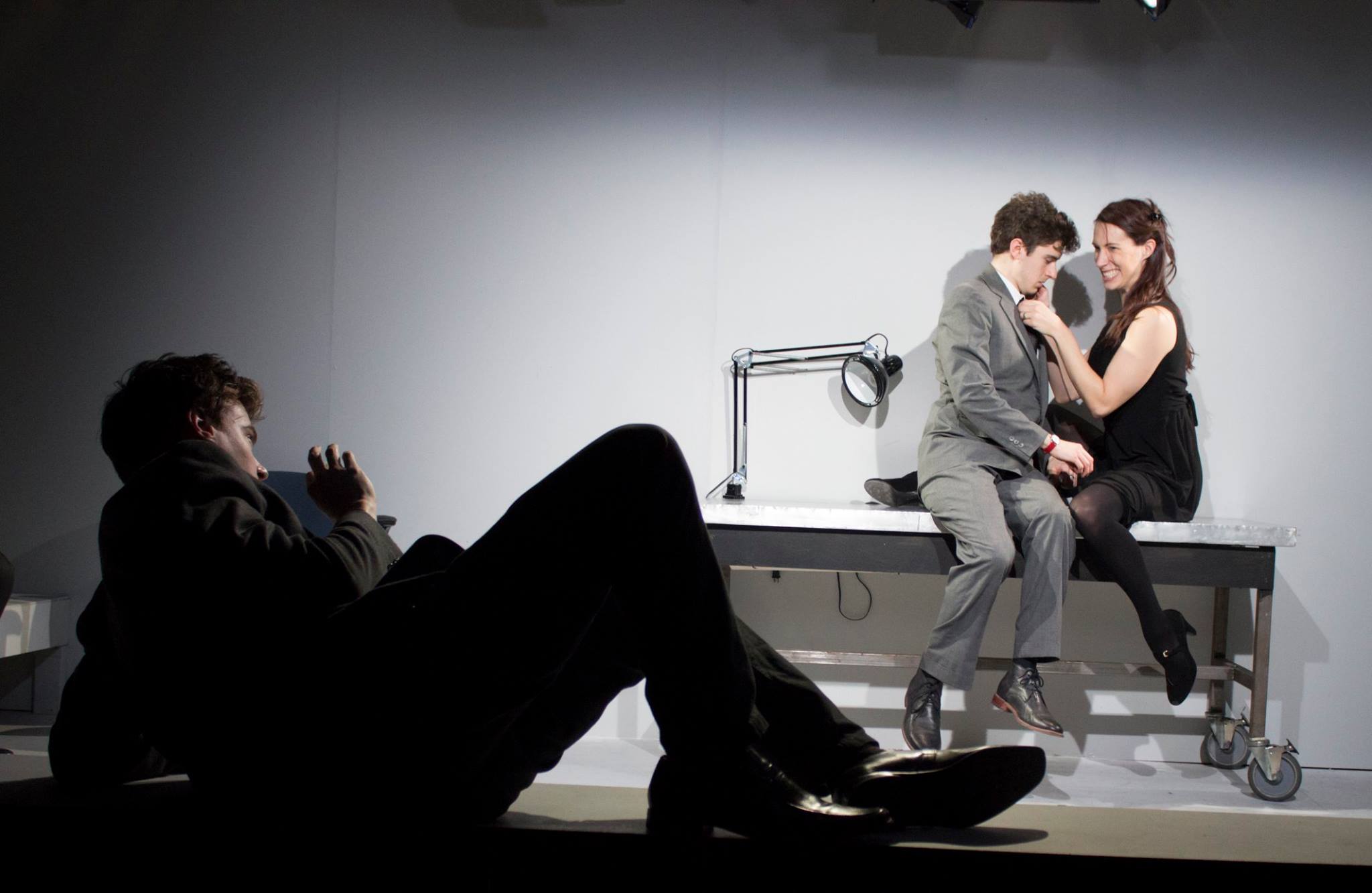Review of The Ugly One, Yale Cabaret
Marius von Mayenburg’s The Ugly One is an extended absurdist sketch about the cult of appearance, or, it could be said, an illustration of the notion “the face makes the man.” So, what if you could wear a face the way you choose to wear certain clothes or cosmetics or hairdos? How good-looking would you have to be? Enough to inspire a following of devoted fans?
The play’s satire is only skin deep, as it gestures to how supply and demand might work in the world of cosmetic surgery, and how a certain brand—one particular physiognomy—might come to dominate. There’s also a few random pokes at psychology, if only to make the case that appearance trumps interiority every time.
In the Yale Cabaret’s current version of the play, directed by Lucie Dawkins, a crackerjack cast keeps the proceedings wacky and disconcerting, aided by Liam Bellman-Sharpe’s slightly offstage sound and Foley art, and Christopher Evans’ projection design. The special effects help create a surgery scene that is a hilarious send up of the “vid it while it’s happening” world we know so well.
Lette (Patrick Madden) (photos: Brittany Bland)
The play’s dark comedy plays out with wonderfully funny performances from the entire cast: Patrick Madden, one of the most consistently subtle actors in the School of Drama, is Lette, a man who discovers, suddenly, that he’s too ugly to hawk his new invention to the public; Steven Johnson plays an underling who gets the PR spot; Danilo Gambini enacts the flippant boss; and Emily Reeder seems sweet and supportive as Lette’s wife. Then—in sometimes quite quick variations—Gambini doubles as the surgeon consulted to replace Lette’s ugliness with something better; Reeder plays as an aged but re-worked chief executive enamored of Lette’s post-surgery looks, and Johnson enacts the executive’s tortured son, a sexual plaything of his “domineering mother.” And Madden doubles as Lette, now an icon of irresistible looks.
As the boss, Gambini spends much of the time peeling and eating various kinds of fruit while also bossing his underlings with manic glee. Then, as the surgeon, he treats Lette’s misgivings with a blithe, offhand indifference that is oddly charming. In both roles, his looniness is infectious.
The surgeon (Danilo Gambini), Lette (Patrick Madden)
Madden gives Lette the kind of stoical common sense that works well as a foil to everyone else’s preposterousness. His frenetic debate with his reflection in an elevator late in the play pits borderline hysterics against savvy sangfroid.
Reeder, as Lette’s wife, is agreeable until she realizes, faced with his sudden good looks, that she has desires too—especially when her husband, now a magnet of female attention, tries to convince her to accept him sharing himself with 25 different women, particularly that oversexed executive. Both women become amorous amazons eager to have sex with beautiful men.
foreground: the son (Steven Johnson); background: Lette (Patrick Madden), the mother (Emily Reeder)
Johnson gets the darker roles, as usual. Kalmann, the assistant, is full of thwarted ambition, while the son is a puerile mess who eventually makes his own play for Lette, once they share the same irresistible looks.
One might say the switches between characters could be better maintained, but the amorphousness of this fast-paced comedy is what makes it work. By the end, it’s hard for the characters themselves to know who they’re dealing with, as more and more people sport Lette’s new face. And Lette wonders what exactly makes him himself.
The projections, cameras, and other effects help create a world of distortions where normative behavior is lacking. The set—a desk/operating table/bed with a much abused angle-poise lamp, surrounded by a low wall on which cast members sit and look on when offstage—makes the action feel improvised and self-enclosed. It’s an anodyne space for a tempest of actions and reactions, of ambitions and envies and lusts and sorrows.
The Ugly One lets us know that, while beauty may be only skin deep, ugliness can be all-encompassing. After seeing the Yale Cabaret production, you may not look at yourself, others, or fruit the same way as before.
The Ugly One
By Marius von Mayenburg
Translated by Maja Zade
Directed by Lucie Dawkins
Producer: Markie Gray; Dramaturg: Gavin Whitehead; Set Designer: Jessie Chen; Costume Designer: Beatrice Vena; Lighting Designer: Nic Vincent; Sound Designer & Foley Artist: Liam Bellman-Sharpe; Projection Designer: Christopher Evans; Technical Director: Dashiell Menard; Stage Manager: Chad Kinsman
Cast: Danilo Gambini, Steven Johnson, Patrick Madden, Emily Reeder
Yale Cabaret
December 7-9, 2017
And that’s it for the first half of Yale Cabaret’s Season 50. The season recommences January 11-13 with For Your Eyes Only.


